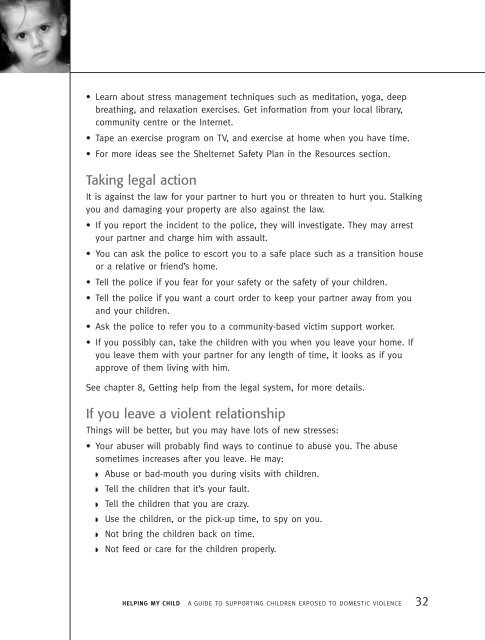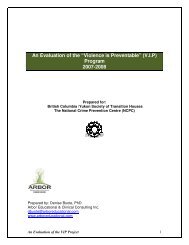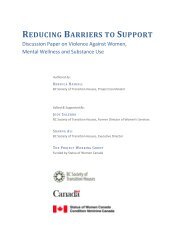a guide to supporting children exposed to domestic violence
a guide to supporting children exposed to domestic violence
a guide to supporting children exposed to domestic violence
You also want an ePaper? Increase the reach of your titles
YUMPU automatically turns print PDFs into web optimized ePapers that Google loves.
• Learn about stress management techniques such as meditation, yoga, deep<br />
breathing, and relaxation exercises. Get information from your local library,<br />
community centre or the Internet.<br />
• Tape an exercise program on TV, and exercise at home when you have time.<br />
• For more ideas see the Shelternet Safety Plan in the Resources section.<br />
Taking legal action<br />
It is against the law for your partner <strong>to</strong> hurt you or threaten <strong>to</strong> hurt you. Stalking<br />
you and damaging your property are also against the law.<br />
• If you report the incident <strong>to</strong> the police, they will investigate. They may arrest<br />
your partner and charge him with assault.<br />
• You can ask the police <strong>to</strong> escort you <strong>to</strong> a safe place such as a transition house<br />
or a relative or friend’s home.<br />
• Tell the police if you fear for your safety or the safety of your <strong>children</strong>.<br />
• Tell the police if you want a court order <strong>to</strong> keep your partner away from you<br />
and your <strong>children</strong>.<br />
• Ask the police <strong>to</strong> refer you <strong>to</strong> a community-based victim support worker.<br />
• If you possibly can, take the <strong>children</strong> with you when you leave your home. If<br />
you leave them with your partner for any length of time, it looks as if you<br />
approve of them living with him.<br />
See chapter 8, Getting help from the legal system, for more details.<br />
If you leave a violent relationship<br />
Things will be better, but you may have lots of new stresses:<br />
• Your abuser will probably find ways <strong>to</strong> continue <strong>to</strong> abuse you. The abuse<br />
sometimes increases after you leave. He may:<br />
◗<br />
◗<br />
◗<br />
◗<br />
◗<br />
◗<br />
Abuse or bad-mouth you during visits with <strong>children</strong>.<br />
Tell the <strong>children</strong> that it’s your fault.<br />
Tell the <strong>children</strong> that you are crazy.<br />
Use the <strong>children</strong>, or the pick-up time, <strong>to</strong> spy on you.<br />
Not bring the <strong>children</strong> back on time.<br />
Not feed or care for the <strong>children</strong> properly.<br />
HELPING MY CHILD A GUIDE TO SUPPORTING CHILDREN EXPOSED TO DOMESTIC VIOLENCE 32






